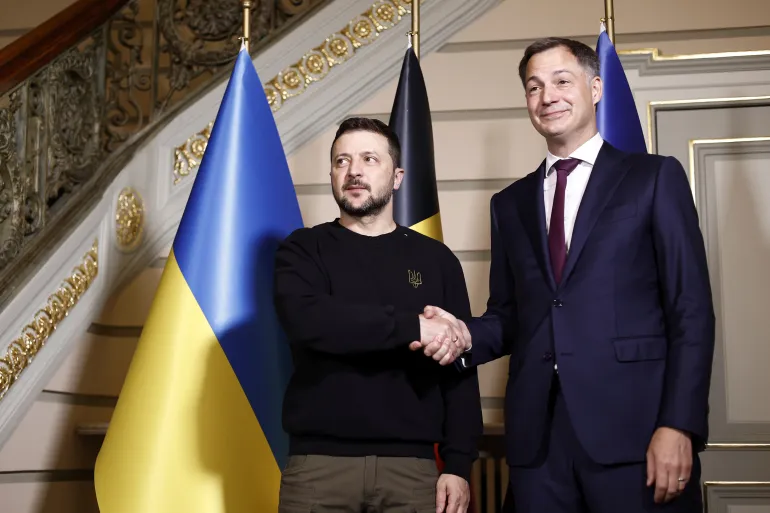
The push by some EU states to raise support comes as others, such as Hungary, have worked to block military aid.
European Union defence ministers are meeting in Brussels to try again to raise military support to Ukraine.
The meeting on Tuesday comes as Ukraine and several EU states seek to increase supplies of weapons and ammunition amid efforts by Hungary, which has long appeared to follow a pro-Russian line, to block aid.
The urgency has grown in the third year of Moscow’s full-scale invasion as Ukraine finds itself on the back foot, provoking pleas from Kyiv and increased efforts by its closest allies.
Ukrainian President Volodymyr Zelenskyy is on a two-day tour of Spain, Belgium and Portugal in a bid to drum up additional support. He has already secured several pledges.
Belgian Foreign Minister Hadja Lahbib said on Tuesday that Brussels will equip Ukraine with 30 F-16 fighter jets with the first deliveries planned for this year, the Belga news agency reported.
The planes will be supplied as part of a security agreement signed between the two countries that will see Belgium provide at least 977 billion euros ($1.06bn) in military aid.
“Ukraine can only push back the invader if we provide better arms at faster pace,” Belgian Prime Minister Alexander De Croo said.

Desperate
Zelenskyy signed a similar deal with Spain on Monday, securing a pledge from Madrid for additional air defence missiles to help fight the nearly 3,000 bombs that he said Russia launches against Ukraine every month.
Dutch Defence Minister Kajsa Ollongren announced on Tuesday that the Netherlands will deliver parts for a Patriot air defence system to Ukraine. The Dutch government is talking to other countries about sending other parts to assemble a complete system, she added.
“Ukraine is also fighting Europe’s fight,” she said.
As it is subjected to nightly barrages of Russian missiles and drones, Ukraine has been desperately urging its allies to send more air defence systems.
Also on Tuesday, Ukrainian Prime Minister Denys Shmyhal was due to meet a group of EU leaders in Prague to discuss a Czech-led initiative to provide ammunition to Kyiv.
Speaking before the meeting, Czech Prime Minister Petr Fiala confirmed that the first deliveries of ammunition procured as part of the initiative, which sources supplies from outside the EU, would reach Ukraine in June.

Hungarian obstacle
However, an estimated 6.5 billion euros ($7bn) in military aid remains stalled by the Hungarian government of Prime Minister Viktor Orban, considered Russia’s staunchest ally in the EU.
Member states have wide veto powers in the bloc, and Hungary has long delayed funds to boost Ukraine’s defence.
Anger among EU leaders with Budapest has been rising over the past year as it has prevented payouts from a central EU fund to reimburse member states for weapons sent to Ukraine.
The Hungarian hold-up also threatens to delay the spending of billions more in interest from frozen Russian Central Bank assets that the EU expects to start receiving in July.
“We cannot let European military support to Ukraine be taken hostage of [by] other decisions which have nothing to do with this specific issue,” EU foreign affairs chief Josep Borrell said after a meeting of foreign ministers in Brussels.
“Especially given the urgency of the situation – Ukraine needs the arms now,” he said.

